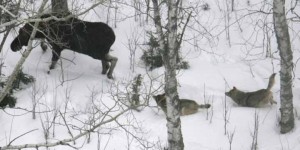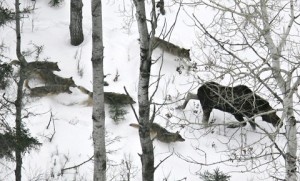
The monumental Isle Royale Wolf/Moose Study, which has been active for more than fifty years, has been a riveting drama to follow. In recent years, the wolf population has been in decline, raising questions as to the future of the wolf on Isle Royale. Below-average temperatures this winter have created an ice bridge between Isle Royale and the mainland, a fairly-rare and potentially promising event for the wolves of Isle Royale. Read what Michigan Tech’s Rolf Peterson and John Vucetich have to say on the subject in this week’s issue of Nature http://www.nature.com/news/iconic-island-study-on-its-last-legs-1.14697 and don’t miss the link to the editorial at the end of the article.
 Join us in the field for a Moosewatch research expedition as part of the Wolf-Moose Study program on Isle Royale!
Join us in the field for a Moosewatch research expedition as part of the Wolf-Moose Study program on Isle Royale!
 July 1, 2010—By
July 1, 2010—By